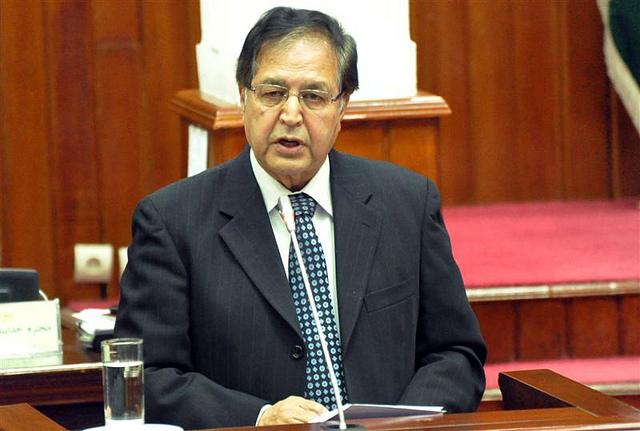KABUL on Monday sought explanation from the High Oversight Commission on Implementation of Constitution (HOCIC) if the lower house had a constitutional mandate to summon the central bank chief.
On April 24, the assembly had agreed to firm up a new date for summoning Da Afghanistan Bank Governor Noorullah Dilawari and decide his fate after he twice failed to appear before lawmakers.
Before that, lower house commission heads had summoned Dilawari on April 14 to brief legislators about the problems facing the banking sector, particularly the New Kabul Bank.
At the time, Speaker Abdul Rauf Ibrahimi had said the house had been informed by the central bank that its chief Dilawari had gone abroad and could not attend the session on April 14.
Dilawari was away on April 24 as well and Ibrahimi told the session that lawmakers should set a new date for calling him. He tasked the committee of panel heads to come up with the new date.
During Monday’s session, Ibrahimi said Dilawari should have appeared before the house as decided by the committee. However, he added Dilawari had sent a letter, saying the lower house lacked the authority to summon him.
Article 64 of the Constitution says the president appoints ministers, the Attorney General, the Central Bank chief, the National Security Directorate head and the President of the Afghan Red Crescent Society with the endorsement of the House of People.
Under Article 92 of the Constitution, the Wolesi Jirga, based on a proposal from one-tenth of its members, can grill ministers on a variety of issues. If the explanation offered is not satisfactory, the house can consider bringing a vote of no-confidence against a minister.
A no-confidence vote against a minister should be explicit, direct and based on cogent reasons. The vote has to be approved by a majority of house members.
At today’s session, a number of lawmakers said they had given the trust vote to Dilawari and they had the right to withdraw it.
Ghulam Farooq Majrooh from western Herat province said the assembly under its internal rules of procedure could summon even heads of independent organisations. However, other lawmakers disagreed with his assertion.
A lawmaker from southern Helmand province, Sheikh Nimatullah Ghafari, said the Wolesi Jirga had no authority to summon officials, except ministers. “We should not go beyond our authority.”
His views were endorsed by a number of colleagues, with Ibrahimi saying the house held two views on the issue. He suggested the matter should be referred to the High Oversight Commission on Implementation of Constitution for interpretation.
Four years ago, the Wolesi Jirga had summoned Attorney General Mohammad Ishaq Alokozai, but he did not appear, saying the house had no authority to question him.
However, later the High Oversight Commission on Implementation of Constitution explained the assembly had the authority to summon the Attorney General.
ma
Visits: 0









GET IN TOUCH
NEWSLETTER
SUGGEST A STORY
PAJHWOK MOBILE APP